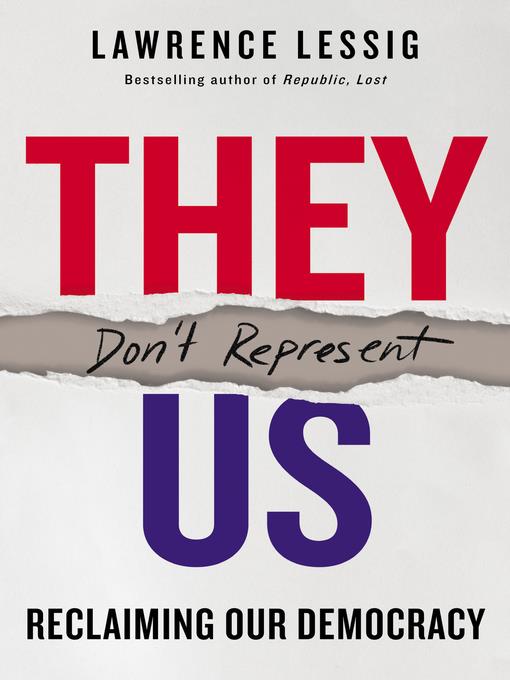
They Don't Represent Us
Reclaiming Our Democracy
کتاب های مرتبط
- اطلاعات
- نقد و بررسی
- دیدگاه کاربران
نقد و بررسی

September 1, 2019
In our endangered democracy, the nation's citizens deserve to be heard. In his latest critique of American democracy, Lessig (Law and Leadership/Harvard Law School; Fidelity and Constraint: How the Supreme Court Has Read the American Constitution, 2019, etc.), host of the podcast Another Way and co-founder of Creative Commons, focuses on a crisis that he sees as "much more fundamental" than the current president: "unrepresentativeness." This lack of representation has several causes: the structure of the Senate, with two representatives from every state, no matter the population; the winner-take-all system in the Electoral College, which negates the choice of many voters and impels candidates to focus on swing states; campaign funding that gives wealthy contributors hefty influence; gerrymandering, which usually benefits extremists of both parties; and voters who lack a shared reality and "are divided and ignorant (at least about the other side) and driven to even more division and ignorance" by media that seek to make profits rather than to inform. "The consequence together is thus not a democracy that always bends to the rich," Lessig argues persuasively. "It is a democracy that cannot bend, or function." The author's many proposals to improve representation are less convincing than his analysis of problems. His suggestions range from giving every citizen "speech credits" or "democracy coupons" to fund political campaigns to paying voters to watch long, "wonderful and hilarious" political ads. Lessig deems the Senate "the hardest circle to square," admitting that some of his ideas--reforming the filibuster and allocating votes for leadership based on population--are unlikely to happen. As far as the Electoral College, the author advocates that states' electors should reflect the national popular vote; or, if not, then Congress should allow electors to cast fractional votes. To engage the electorate, Lessig proposes "a congressional jury" made up of randomly chosen citizens to examine both sides of a public issue and make recommendations that, he asserts, a congressman would be morally bound to consider. An impassioned call to all Americans to fight for equal representation.
COPYRIGHT(2019) Kirkus Reviews, ALL RIGHTS RESERVED.

October 21, 2019
In this urgent and hard-hitting analysis, Harvard law professor Lessig (Fidelity & Constraint) dissects the causes, consequences, and possible remedies for the crisis of “unrepresentativeness” facing American democracy. The sources of government dysfunction, Lessig writes, include voter suppression laws; gerrymandering; the “fraught” design of the Senate, which gives outsize power to less populous states; the Electoral College; and “money in politics.” The problems aren’t just with “them” (politicians, power brokers), however; they’re with “us” (American voters), too: technology- and market-driven changes in the media landscape, especially the advent of cable TV and the rise of the internet, have left the voting public “divided and ignorant” on policy and therefore “incapable as citizens,” according to Lessig. In the book’s second half, he proposes a series of fixes. Some, such as ranked-choice voting, seem sensible; others, including “democracy coupons,” in which every citizen would be given a stipend to contribute to political candidates as they see fit, appear complicated and expensive to institute, especially in the current political climate. But Lessig’s call for a “slow democracy movement” to create better informed voters resonates, and he lists many examples of citizen movements that have achieved their goals. This bracing report on the state of American politics offers valuable insights for the 2020 elections.

October 1, 2019
Distinguished Harvard law professor and author Lessig declares that our democracy is in crisis and that he understands that the challenges to rectify the situation can seem insurmountable. He traces the evolution of our democracy from the vision of the framers of the constitution to the enormous influence on Washington of money, lobbyists, polling, and the media, resulting in the erosion of genuine representation of "We, the people." Lessig offers a thoughtful, illuminating, nonpartisan, and pragmatic analysis of the changes needed to restore power to the public. He addresses the need to reform the electoral college, to end gerrymandering and voter repression, and to reform campaign financing. Lessig also addresses people's need to renew their civic commitment to be well informed and to vote. In this bold and compelling book, Lessig both scrutinizes the laws and forces that led us to this point and guides us towards visionary changes that can reset and restore our faith in our democracy. Given the complexities of the tasks at hand, this a must-read and a much-needed wake up call.(Reprinted with permission of Booklist, copyright 2019, American Library Association.)

























دیدگاه کاربران